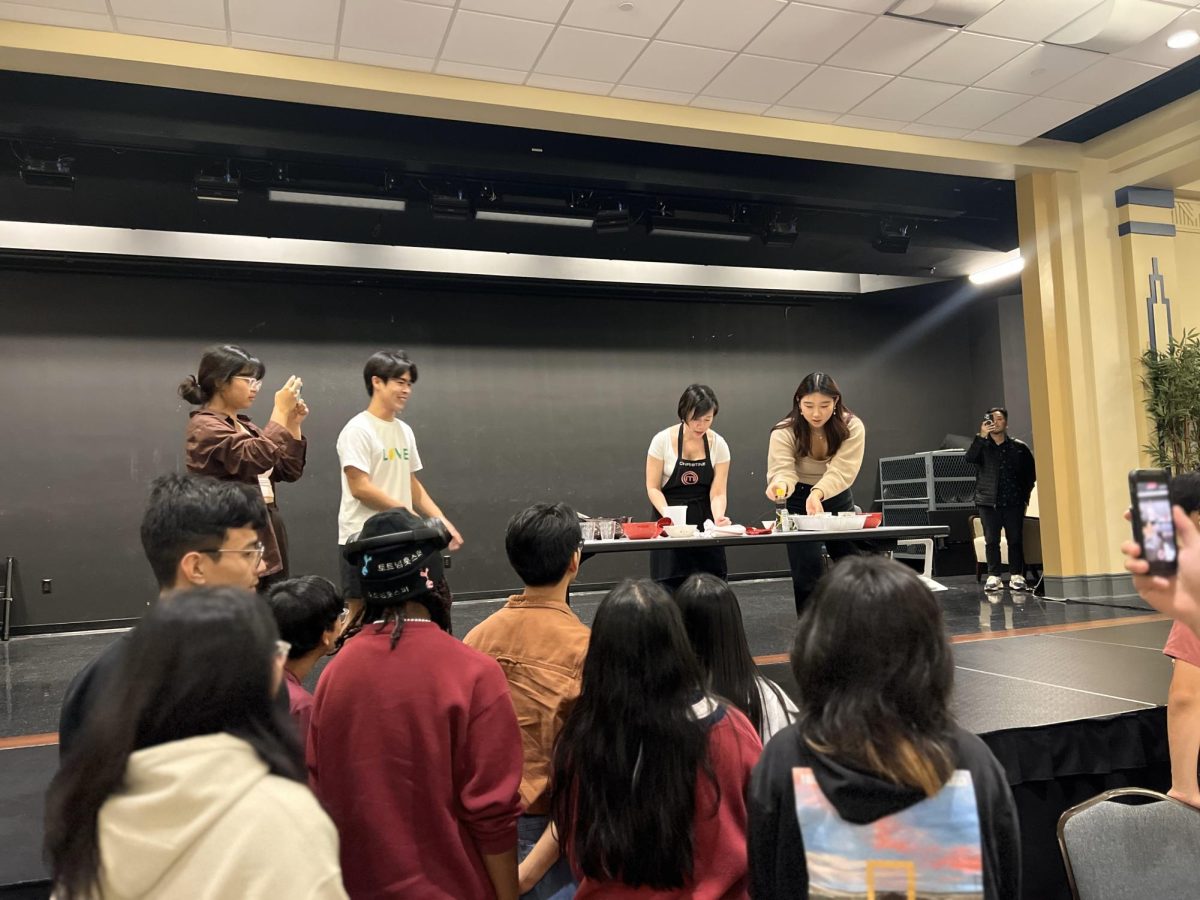Pitt’s Asian Student Alliance hosted a speaker event featuring Christine Ha, a blind chef who won the third season of “Masterchef.” The event on Nov. 17 commenced with a Q&A session on stage in the assembly room of the William Pitt Union, where Ha fielded questions from the audience and shared her experience as a Vietnamese-American with members of ASA. Ha treated the audience to a cooking demonstration, where she showcased her culinary prowess with the assistance of a member of the audience.
After a Q&A session, ASA members transformed the stage into a small kitchen with a table and cooking equipment. Using boiled eggs and sauce made of water, soy sauce, sugar, scallions, garlic and toasted sesame seeds, Ha taught the audience a simple Korean recipe for “Mayak egg.”
Ha said she first started cooking in college, and her passion has only increased since then. Ha said despite her loss of vision as a young adult, she continued to cook by reteaching herself every cooking skill without sight.
“Cooking is something that I’ve always loved to do as a hobby, especially since I taught myself in college after moving out of the dorms,” Ha said. “Around the same time, I started experiencing vision loss from an autoimmune disease, but I’m very stubborn so I had to continue to teach myself how to cook with less and less sight.”
Ha said after honing her cooking skills, her family spurred her to audition for Masterchef. Ha said her most memorable moment during Masterchef was working in a team to incorporate her Asian heritage into a challenge.
“At the encouragement of my family, I decided to audition for Masterchef,” Ha said. “One of my favorite challenges was when we did a food truck challenge on Venice Beach and I was a part of the team that had South Asian ingredients and I remember taking the lead. Although we didn’t win that challenge, the crew came and ate our food.”
Ha said throughout different steps of her life she struggled with imposter syndrome due to her vision disability and identity. Ha said later in her adult life she was able to acknowledge that she belongs in her field and deserves to succeed.
“I felt imposter syndrome in college, grad school, and then going on into Masterchef where I was thinking ‘What the hell am I doing here, am I really good enough?’” Ha said. “Even with every challenge when I did well, even having won Masterchef, I questioned if I deserved it. Once I hit my 40s, I just realize that there’s a reason why I’m doing what I’m doing and there’s a reason why I have succeeded.”
Robert Rigoroso, senior finance and accounting major and vice president of finance for ASA, said speakers like Ha bolster Asian American representation on campus.
“We have [a] speaker event per semester where we bring in big names in the Asian American community so people can have the opportunity [to] see themselves represented,” Rigoroso said. “Having big Asian American names on campus is huge because it energizes our members to keep being involved in our community.”
Rena Li, senior communication science and disorders major and the president of ASA, said her favorite segment of the evening was the Q&A session. Li said the event was a rare opportunity allowing college students to engage directly with their idols.
“My favorite thing when we bring in a speaker is the Q&A section where the speaker interacts with the audience,” Li said. “In college, it’s a unique opportunity to meet someone famous and ask them personal questions as opposed to meeting them outside in the world and you can’t interact with them.”
Li said having Christine as a speaker is very fitting for the college audience. Li said all college students, especially those living off campus, could learn things from a chef.
“We try to get people every year in different professions,” Li said. “Cooking is something that’s applicable to everyone, especially being in college and having to make meals at home. It’s really nice to have someone of an Asian background to come share their thoughts and successes when it comes to cooking.”
Ha said she uses her platform to speak for the importance of Asian American representation, despite being told to remain silent.
“Growing up as Asian, especially for me as an Asian woman, I was taught to be quiet and obedient and just say yes,” Li said. “I think it’s important to make noise and be loud and clear about what it is that we want, we should always speak out and talk about representation and why that’s important.”


